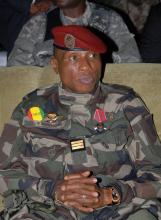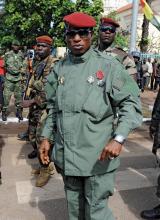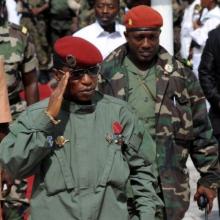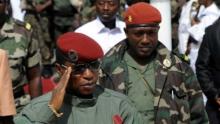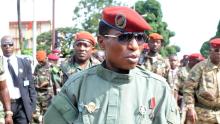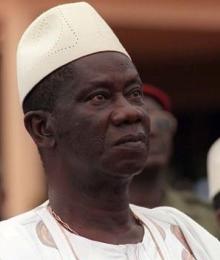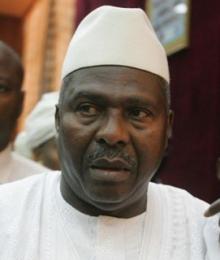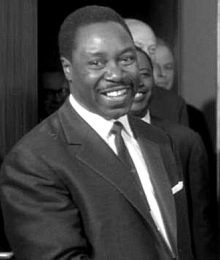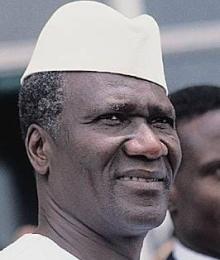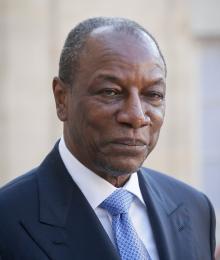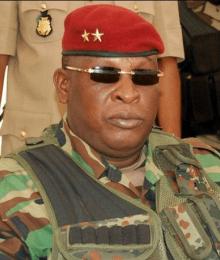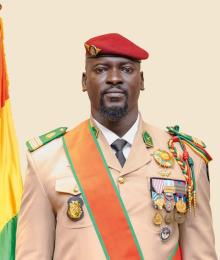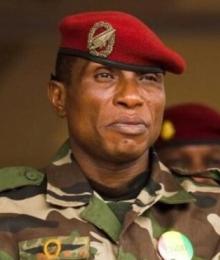
Moussa Dadis Camara (born January 1, 1964) is a Guinean military officer who became President of the Republic of Guinea under controversial circumstances. From a modest Kpelle background, he ascended the ranks of the Guinean army before taking power by force in December 2008, hours after the death of President Lansana Conté. Self-proclaimed leader of the military junta of the National Council for Democracy and Development (CNDD), Camara pledged to hold free elections, but his subsequent actions quickly dismissed his democratic promises.
His presidency, however, turned dramatic when the deadly repression of the peaceful demonstrations of 28 September 2009 in Conakry left hundreds dead and wounded, shocking the international community. Seriously injured in an assassination attempt in December 2009, Camara was forced into exile in Burkina Faso before converting to Catholicism under the name of Moses. Returning to Guinea in 2021, he was arrested and imprisoned to be tried for the 2009 massacres, reviving the wounds of a country slain in search of justice and stability.
Introduction
Moussa Dadis Camara (born January 1, 1964 in Kulé, Nzérékoré Prefecture) is a Guinean military officer and statesman. He assumed the presidency of the Republic of Guinea in a controversial manner in 2008 following a military coup, before being forced into exile in 2010 following an assassination attempt. Today imprisoned and tried for the bloody events of 2009, his career has been marked by reversals and controversial acts that have shaped his controversy in Guinea and on the international stage.
Education
Moussa Dadis Camara came from the Kpelle ethnicity (called Guerze in Guinea) and grew up in the forested region of the south-east of the country. He completed his primary and secondary studies in Nzérékoré, about 40 km from his native village of Koulé. After obtaining his bachelor's degree, he enrolled at the Abdel Nasser University of Conakry, where he studied law and economics.
Military training
In 1990, inspired by Burkinabé President Blaise Compaoré, Moussa Dadis Camara joined the Guinean army as a caporal. He continued his training at the Kindia military base, located approximately 100 km from Conakry. Subsequently, he attended officer courses in Dresden, Germany, and obtained a license as head of department in management in Bremen.
Between 2001 and 2002, Camara was sent to Sierra Leone as part of a United Nations peacekeeping mission. (UNAMSIL). On his return to Guinea, he held the position of Chief of the Essence Section in the General Directorate of the Guinean Army Military Intendence.
In 2004, President Lansana Conté sent him, along with other Guinean soldiers, to attend an 18-month military training in Bremen, Germany. Upon his return, he studied superintendence captainry and logistics at the École d'Infanterie of Hamburg, where he obtained a patent as a parachutist-command.
Military career
After serving as Head of the Essences and Supplies Section at the Military Intendence of the Armed Forces from 2005 to 2007, Moussa Dadis Camara was appointed Director-General of Essences and Lubricants in 2008. At the same time, he attended courses at the Guinean Inter-Army Military School of Staff (EMIAG).
Prior to the December 2008 coup, Camara was relatively unknown to the general Guinean public. However, he was one of the main rioters involved in the military unrest that shook the country that year.
Takeover
On December 22, 2008, President Lansana Conté died after a long illness. In accordance with the Constitution, the President of the National Assembly, Aboubacar Somparé, was to provide interim until a new presidential election was held within 60 days.
However, on the night of December 23, Captain Moussa Dadis Camara appeared on national television to announce the suspension of the Constitution, the dissolution of the government and the republican institutions. He justified this military coup by the "deep despair" of the Guinean people in the face of widespread poverty and endemic corruption.
On December 24, Camara was appointed head of the National Council for Democracy and Development (CNDD), the ruling military junta. He then proclaimed himself interim president of the Republic of Guinea, promising to hold "free, credible and transparent" elections by the end of December 2010.
President of the Republic
As soon as he came to power, Moussa Dadis Camara appointed Cabinet Komara, a banker, as Prime Minister on December 30, 2008. He also reiterated his commitment to holding democratic elections in which neither he nor the members of the CNDD would be a candidate.
However, in April 2009, he threatened to run for the late 2009 presidential election if criticism of the CNDD persisted. This statement raised concerns about his genuine democratic intentions.
In an effort to revive the image of Guinea, known for being a milestone in drug trafficking in West Africa, Camara launched a campaign to combat drug traffics. It was broadcast through the "Dadis Show", televised trials widely followed by the population.
It also sought to attract foreign investors by reassuring economic operators and by arresting senior officials and senior officers accused of corruption under the former regime.
Dadis Show
The "Dadis Show" is an expression born of the improvised and spectacular speeches and decisions of Moussa Dadis Camara during his media appearances. During these popular shows, the president spoke spontaneously, delivering speeches with raw words and announcing spectacular resolutions, sometimes accompanied by unexpected dismissals.
These shows were both feared by the dignitaries of the regime, who were at risk of being fired at any time, and appreciated by a part of the population who saw a wind of change and transparency after decades of opacity.
Events of September 28, 2009
On September 28, 2009, protests took place at the September 28 Stade in Conakry, the capital, demanding the departure of Moussa Dadis Camara. Security forces, including the presidential guard "Red Berets" led by Abubakar "Toumba" Diakité, violently repressed the protesters.
At least 157 people were killed, and more than 1,200 wounded, according to the UN. Dozens of women were also brutally raped by soldiers, provoking international indignation. Although the government has minimized the figures, overwhelming evidence, including photos and videos, has circulated on the Internet, revealing the scale of the massacre.
The International Criminal Court opened an investigation into crimes against humanity, while the African Union and the international community strongly condemned the bloody repression and demanded Camara's resignation.
Assassination attempt
On 3 December 2009, Moussa Dadis Camara was seriously wounded by a bullet in the head in an assassination attempt by his camp assistant, Abubakar "Toumba" Diakité, and other members of his family.
According to some sources, Diakité attempted to eliminate Camara in order to take control of power and avoid being held responsible for the September 28 massacres. Others suggest that Camara sought to cast responsibility for these tragic events on Diakité.
Seriously injured, Camara was transferred to Morocco for medical care. His bodyguard and driver were killed in the attack.
Exile in Burkina Faso
Faced with calls from the international community for his removal from power, Moussa Dadis Camara was eventually forced into exile. On 12 January 2010, he was transferred to Burkina Faso, where President Blaise Compaoré negotiated the terms of his departure with Vice President Sékouba Konaté, who was appointed to lead the transition.
An agreement was reached on 15 January, stipulating that power would be transferred to the civilians within six months and that the military would not run for the forthcoming elections. Camara was to continue his convalescence outside Guinea.
It was during his Burkinabé exile that Moussa Dadis Camara decided to convert to Catholicism, changing his Muslim surname "Moussa" to the French version "Moïse".
Imprisonment and trial
After returning to Guinea on 22 December 2021, 12 years after his forced departure, Moise Dadis Camara was arrested and imprisoned on 27 September 2022 pending his trial for the bloody events of 28 September 2009.
His high-profile trial began on September 28, 2022, with Camara and 10 other former military and government officials charged with murder, rape, voluntary firing and other crimes against humanity committed on that day.
Despite the protests of his lawyers denouncing violations of the rights of the defence, the trial continued in a tense atmosphere, reviving the injuries and traumas suffered by the victims and their families.
Escape attempt
On November 4, 2023, a spectacular escape attempt took place at the Conakry Central Prison where Camara was detained. A group of heavily armed men assaulted the prison, allowing Camara and three other former officials tried with him to escape temporarily.
Nine people, including three assailants and four members of the Guinean Defence Forces, were killed in the attack. Camara and his companions were eventually captured a few hours later.
Despite this aborted attempt, the trial resumed on November 13 after a temporary suspension, with the former president's judicial calvary continuing under the lights.
Conviction
On July 31, 2024, former Guinean Head of State Moussa Dadis Camara was found guilty of crimes against humanity for the massacres committed in 2009 and sentenced to twenty years in prison. Immediately following the verdict, his lawyers expressed their astonishment at this decision, announcing their intention to appeal and also reserving the right to bring the case before the ECOWAS Court of Justice, claiming that their client had been the victim of multiple violations of his rights.
Presidential Pardon
After serving less than three years of his sentence, Dadis Camara was pardoned by presidential decree on Friday, March 28, 2025. A pardon granted for health reasons on the recommendation of the Minister of Justice and Human Rights.
Private life
Moussa Dadis Camara was born in the Kpelle (Guerze) ethnic group and spoke fluently five languages: French, kpelle, subsu, malinké and German, testifying to his multinational military career.
A father of several children, he converted to Catholicism in 2010 during his Burkinabé exile, choosing the French surname "Moïse". The profound reasons for this religious conversion remain vague.
Beyond his bustling military career, little is known about the private life and intimate personality of this man who has profoundly marked Guinea's recent history.
Conclusion
The fate of Moussa Dadis Camara, whose real name was Moses since his conversion, illustrates the torments of a country torn apart by political instability, military coups and bloody repression.
Pushed to power in turbulent circumstances in 2008, this until then obscure officer quickly lost initial popular support by blood-pressing a peaceful protest movement in 2009.
Forced into exile after an assassination attempt, converted to Catholicism, then imprisoned on his return to the country to answer for these acts, Camara still unleashes passions in Guinea today.
His highly mediated trial revives the wounds of a murdered people, in search of truth, justice and stability after decades of authoritarian drifts. The outcome of this painful judicial case could mark a key milestone in the difficult democratic transition of this wealthy West African country.











